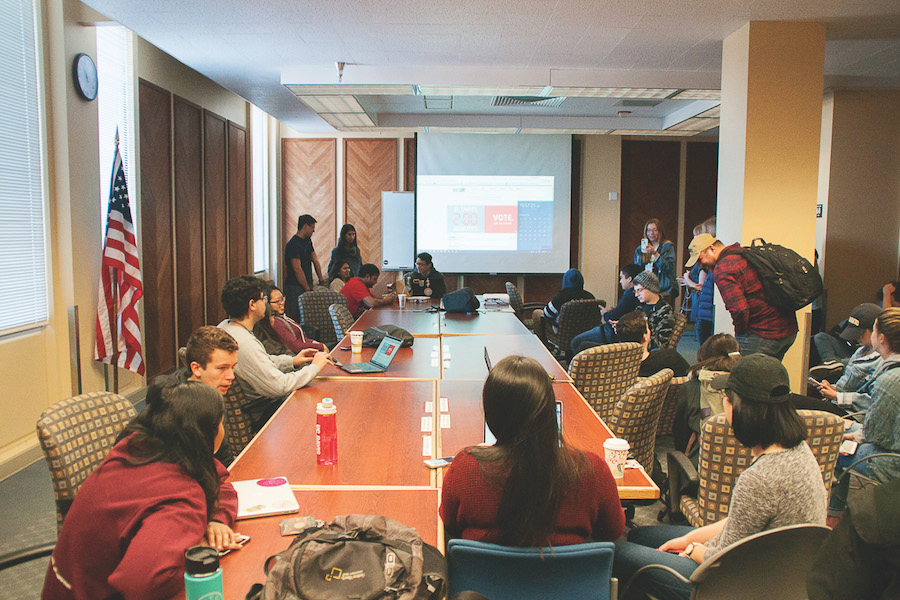
ACT slate candidates, disqualified Golden Slate candidates allege double standards, unequal access
Candidates involved with this year’s ASUCD Winter Quarter elections have expressed frustration over alleged biases within the association — particularly within the Elections Committee — toward ASUCD-affiliated candidates.
Executive candidates from Aggie Community Transfers and former candidates from The Golden Slate have raised complaints for hindrances to their campaigns, a perceived lack of access and double standards between slates with candidates from outside the association and slates with candidates already working inside ASUCD.
Adam Hatefi, a third-year political science major, and Shreya Deshpande, a second-year cognitive science and sociology double major, were disqualified from running in the election on The Golden Slate’s executive ticket on Feb. 9 after Deshpande’s failure to be present at an Elections Committee-held mandatory candidate workshop on Feb. 3. The pair appealed their disqualification to the Judicial Council and addressed Deshpande’s absence as a medical emergency, offering a doctor’s note to exempt her. The Elections Committee previously said that the only exception they would allow for missing the meeting was for a documented medical emergency.
“They said that for documented medical emergencies, ‘We’ll schedule a make-up workshop for you,’ and I was in the clear,” Deshpande said. “I asked them whether I could Skype into the meeting whether there was any other sort of way that I could make it up and there was no response from them.”
The pair alleged a double standard regarding a similar situation with three Unite! senatorial candidates. Unite! candidates Alisha Hacker and Mohammad Qayum left the meeting early for a Model United Nations conference and Unite! candidate Colin Heurlin is currently in the UCDC program. All three were initially given one violation point rather than an immediate disqualification, as general absence from the mandatory meeting mandated. Afterward, however, Heurlin was disqualified.
In response, Elections Committee Chair Naeema Kaleem and Vice Chair Rodney Tompkins discussed their reasoning in a joint statement sent via email.
“The Bylaws do not specify anything about leaving the workshop early, but rather being a half hour late,” the statement said. “The Elections Committee extended the spirit of the Bylaw in question by applying it to candidates who left the workshop a half hour early. Deshpande was absent from the entirety of the meeting, which is an automatic disqualification.”
Hatefi and Deshpande’s appeal hearing affirmed the Judicial Council’s initial ruling of disqualification under the grounds for Deshpande’s absence from the meeting not being excused by her medical documentation.
Hatefi and Deshpande pursued a lawsuit against Kaleem for $100,000 prior to their appeals hearing but subsequently dropped it, claiming to later have found it unnecessary and wanting to avoid causing Kaleem distress.
“As a mental health advocate, I didn’t want the chair of the elections committee to face that kind of burden as a student,” Deshpande said.
There have been complaints of lack of access between the Elections Committee and non-ASUCD affiliated candidates, including as emails and questions over elections code being left unanswered.
“When we have questions as to how the elections committee sees and interprets the different parts of the bylaws so that we know what we are and aren’t allowed to do and we ask questions and they don’t respond, that in itself is hindering our campaign,” Hatefi said.
ACT executive candidates Toni Sandoval, a third-year communication major, and Kevin Butt, a third-year double major in political science and African American and African studies, expressed similar frustrations over the executions of rules over the mandatory workshop.
“I had an obligation that was set almost a year in advance before I got to Davis and it happened to fall on the mandatory elections meeting,” Butt said. “As soon as I found out, I reached out immediately. I asked for any accommodations or any alternates, and I was brushed off simply by Naeema multiple times. Then to come find out it’s okay for two other senators to depart earlier and then only receive one violation point?”
Sandoval and Butt criticized the committee for holding closed sessions from the public and for not holding roll call at the mandatory meeting after candidates left early during its proceedings.
“Student government is supposed to be open session,” Sandoval said. “You’re supposed to open access to public.”
In response, Kaleem and Tompkins addressed the committee’s jurisdiction to hold closed hearings in pursuit of confidentiality in their joint statement.
“The Elections Committee requested a closed hearing due to the fact that the Office of Student Support & Judicial Affairs was involved with the Hatefi-Deshpande case,” the statement said. “It was well within our rights as respondents to request a closed hearing, as per Judicial Council Code Six.”
Issues of conflicts of interest from within the association have not come up on the Senate table for discussion. ASUCD Senator Andreas Godderis says “natural biases” against ASUCD affiliated individuals are inherent.
“Being closed off to any outsiders is a very common thing for people within ASUCD to do, but I don’t see it as very healthy,” Godderis said. “You got a few members from BASED, a few members from Unite!, those two slates both benefited from this disqualification, so naturally that’s not going to be brought up [on the table].”
Unite! candidates Michael Gofman and Shaniah Branson have been elected as the new ASUCD president and vice president, respectively. Three candidates from BASED and three candidates from Unite! were elected as the new senators.
Written by: Elizabeth Mercado — campus@theaggie.org
Correction (updated 3/2/18 at 3:30 p.m.)
A previous version of this article stated that Shreya Deshpande was a third-year student, which is incorrect. Deshpande is a second-year student.









Great article, thanks for the coverage! Just wanted to clarify, I’m a second year.